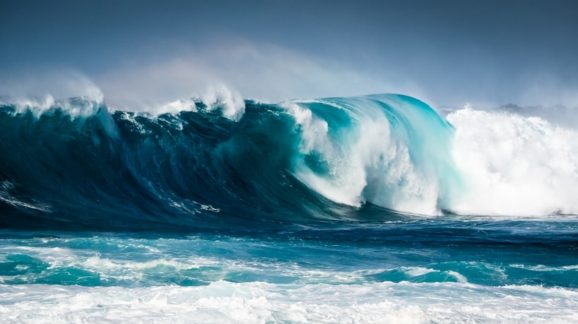Study Finds Strong Acceleration in Ocean Circulation

 As part of its “Climate in Crisis” series, NBC News on February 11 reported the results of a new study on “the undersea conveyor belts that help regulate Earth’s climate and influence weather systems around the world.” Add the NBC article to your “worse than we thought” file. To quote the headline: “Climate change models predicted ocean currents would speed up—but not this soon.”
As part of its “Climate in Crisis” series, NBC News on February 11 reported the results of a new study on “the undersea conveyor belts that help regulate Earth’s climate and influence weather systems around the world.” Add the NBC article to your “worse than we thought” file. To quote the headline: “Climate change models predicted ocean currents would speed up—but not this soon.”
NBC elaborates: “Climate models had predicted that ocean circulation would accelerate with unmitigated climate change, but the changes had not been expected until much later this century, said a co-author of the study, Michael McPhaden, a senior scientist at the National Oceanic and Atmospheric Administration. The disparity suggests that some climate models may underestimate the effects of global warming.”
The article continues: “McPhaden and his colleagues discovered that currents in three-quarters of the world’s oceans have accelerated over the last two decades, driven primarily by faster, more intense winds. On average, the researchers found that global ocean circulation has accelerated by 36 percent since the early 1990s.” The strength and persistence of the change is “just too dramatic to be accounted for by natural fluctuations,” McPhaden stated.
NBC then purports to explain why the study matters: “Ocean currents form a complex web of underwater highways that move water and heat around the globe. Warm water funneled by currents from the equator to the poles, for example, helps regulate land temperatures and drive weather systems.” As one environmental group analyst told NBC, the circulation system “keeps the tropics cool enough to live in and northern regions warm enough to live in.” Thus, changes in ocean circulation could “threaten the planet’s life-support system.”
Oh, how soon they forget! In the mid-2000s, many in the climate fraternity inferred planetary peril from an apparent slowdown in the North Atlantic conveyor belt.
The general public first heard about it in October 2003 when the Pentagon released a report on the national security risks of “abrupt” climate change. The authors speculated that, by 2010, global warming could cause the Atlantic conveyor belt to shut down, plunging Europe and parts of North America into a little ice age.
How might global warming cause regional cooling? Supposedly, fresh water pulses from Greenland ice melt could so reduce the density of North Atlantic surface water that the latter no longer sinks forcefully enough to drag warm water up from the tropics to the higher latitudes.
What made this a potential national security issue? Decades of cold dry weather would depress global agriculture, setting the stage for famine, chaos, and war. This doomsday scenario made its Hollywood debut in The Day After Tomorrow (2004). Al Gore also featured it in An Inconvenient Truth (2006).
In 2013, the Fifth Assessment Report of the U.N. Intergovernmental Panel on Climate Change called off the apocalypse, concluding that ocean circulation collapse is “very unlikely” in the 21st century (table 12.4). Even during the mid-2000s, empirical evidence for a slowing conveyor belt was mixed, and some scientists argued that even complete collapse would not be catastrophic (see pages 11-12 of this 2007 testimony).
But one thing climate campaigners did not decry or warn about in the 2000s was a more energetic ocean circulation system. In light of those earlier alarms, shouldn’t NBC at least wonder whether climate change is “better than we thought”?